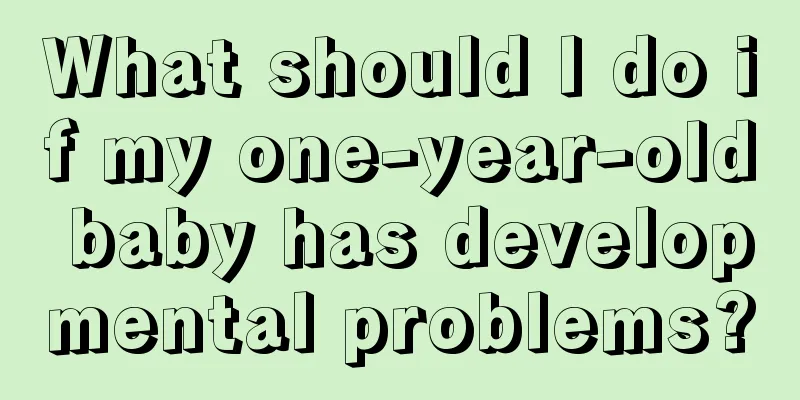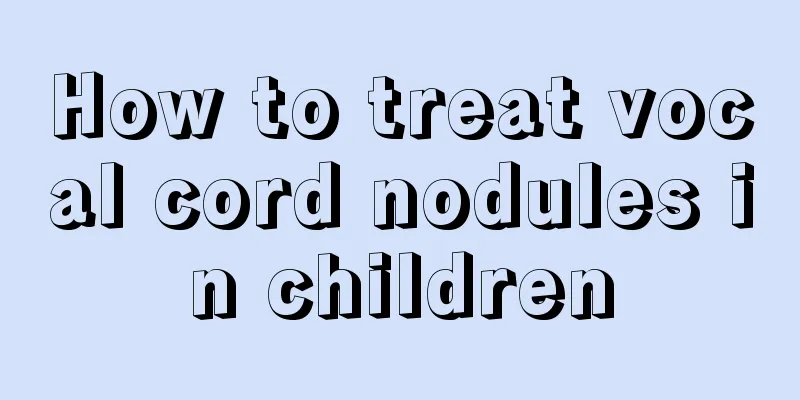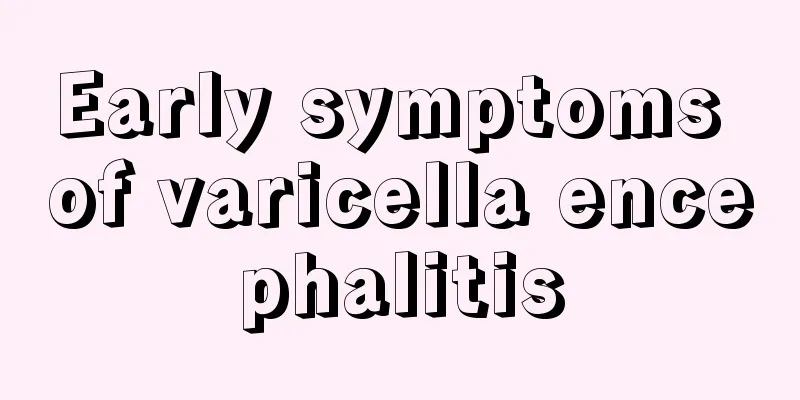What should I do if my one-year-old baby has developmental problems?

|
Every baby captures the hearts of his or her parents from the moment they are born. Once they discover that they have health problems, many parents will panic and not know what to do best. When a one-year-old baby is stunted, the first thing to do is to find out why the baby is stunted, and then send him to a local regular hospital for a comprehensive examination in time to find the most effective treatment method and provide the baby with a safer treatment environment. Cerebral dysplasia refers to the incomplete development of the brain in children. It is a disease characterized by mental retardation and growth retardation due to the reduction of brain tissue, incomplete development of brain nerve cells, or damage caused by some reasons. Common causes of brain dysplasia include abnormal brain development during the embryonic period or the mother's illness during pregnancy, dystocia, birth trauma, asphyxia at birth, intracranial hemorrhage in the neonate, febrile convulsions, carbon monoxide poisoning, encephalitis, meningitis, head trauma and genetic factors. Cerebellar dysgenesis is immature development of the cerebellum. It remains in a certain embryonic stage. Cerebellar hypoplasia may be due to inadequate development of the cerebellar vermis or cerebellar hemispheres. Cerebellar vermis hypoplasia may be an independent malformation or a component of the Dandy-Walker malformation. Brain CT and MRI can assist in the diagnosis of this disease. There is no specific treatment. Severe cases often result in death before the age of 10. For those with milder lesions, cerebellar symptoms can gradually compensate and improve. Early symptoms of cerebral hypoplasia include severe deficits in adaptive behavior. Developmental delay in all aspects in early years. The pronunciation is unclear, the speech is very little, and the ability to express oneself is very poor. Lack of abstract concepts and poor comprehension ability. Emotionally immature. The movements were very clumsy. Symptoms of cerebral dysplasia vary greatly. Men and women have equal chances of developing the disease. Cerebellar symptoms are usually discovered when the child becomes ataxia when reaching for objects and has an intention tremor and often head shaking. Sitting, standing and walking are all slow, gait is unsteady, language development is delayed and presents intermittently or in bursts, and there is obvious ataxia, muscle weakness and hypotonia in the trunk and lower limbs. Nystagmus is common, sensation is normal, and most patients have intellectual disability, growth retardation, or epileptic seizures. In some cases, symptoms may be limited to one side and may be accompanied by manifestations such as chorea. "Neural tissue repair therapy" is an original medical achievement successfully developed by the Third Hospital of the Beijing Armed Police Corps that integrates multiple disciplines such as molecular biology and regenerative medicine. This therapy uses neural factor transplantation to not only replace damaged brain nerve cells, but also has multi-directional differentiation functions. The neural factors can differentiate into a large number of neurotrophic factors, nerve growth factors and neuroimmune regulatory factors in the nerves around the lesions, improve the activity of nerve fibers, axons, dendrites, dendritic spines and synapses in the lesions, promote blood circulation and nerve cell metabolism in the brain, and enhance the body's immunity. It has a long-term and stable consolidation therapeutic effect. Therefore, neural tissue repair therapy can be a good treatment for patients with brain hypoplasia. In fact, it is difficult to discover the situation of developmental problems in one-year-old babies in our daily lives, because one-year-old babies cannot speak yet, and their reproductive organs in all aspects of the body are not yet mature, so there are big problems in expression. At this time, parents play a key role. They must always pay attention to the baby's complexion. If you find that your baby's complexion is different from usual, you must take the correct approach to solve the problem. |
<<: What to do if a child has developmental problems
>>: Is it good for children to take a bath when they catch a cold in autumn?
Recommend
What are the development indicators of a two-month-old baby?
Many parents are worried about their children'...
Neonatal jaundice index and treatment methods
Nowadays, the incidence rate of newborns is getti...
How many days should I take anti-inflammatory medicine for a minor surgery?
Some girls go to the hospital for abortion after ...
Popularization of knowledge about baby myocarditis
We all know that babies have relatively poor phys...
Causes of uneven back of newborn's head
Many newborns have uneven backs of the heads, so ...
What is occult phimosis in children?
Hidden phimosis in children refers to the occurre...
Two and a half year old child walks unsteadily
Two and a half year old child walks unsteadily If...
What to do when a child lies
Adults always hate children who lie and think it ...
Can children eat black wolfberry?
Wolfberry is a food ingredient that has a nourish...
Chalazion in children
Chalazion in children is a disease that occurs in...
Causes of fever and dizziness in children
Many parents will face this problem that their ch...
What should I do if my baby gets prickly heat? How should I solve it?
Babies' skin is more delicate than that of ad...
Why do babies sweat?
Many newborn babies have a characteristic, which ...
What are some common sense about children's health care in autumn?
Children grow and develop very quickly, which can...
Is it okay for children to take growth hormone?
The human body needs growth hormone to grow. Some...









